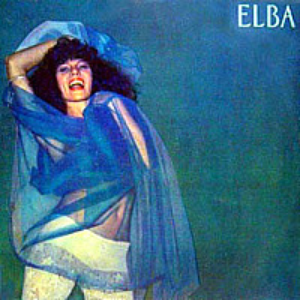Elba Ramalho was born in the rural area of Conceição, in Vale do Piancó. In 1962, the family moved to the city of Campina Grande, also in Paraíba. Her father became the owner of the local theater. Daughter of a musician, she became interested in music still as a teenager.
In 1966, she participated, for the first time, in a performance on stage, in the Choir of the Fundação Artística e Cultural Manuel Bandeira, of which she was a member, with "Evocação do Recife". The Manuel Bandeira and Cecília Meireles Talking Choirs gained fame and started to be seen all over the Northeast, and Elba, who made her first presentation on stage together with them, soon became the highlight in the presentations. She starred in the poetic montages of Castro Alves, Thiago de Mello, Lindolfo Bell, Carlos Pena Filho and Figueiredo Agra. He participated in the montages of the plays "Ministro do Supremo" and "Diálogo das Carmelitas."
In 1968, while attending college of Economics and Sociology at the Federal University of Paraíba, she formed the ensemble As Brasas, in which she acted as drummer, which later became a theater group. However, Elba never stopped singing, and performed in several festivals throughout the Northeast.
In 1979, she released her first album, "Ave de Prata", and since then she has consolidated her position as one of the main Brazilian singers in activity. On her father's side, she is a cousin of fellow singer Zé Ramalho.
She has two Latin Grammys for her albums: Qual o Assunto Que Mais Lhe importa?, released in 2008, and Balaio de Amor, 2009, in the category Best Brazilian Roots Album: Regional and Tropical. In over 35 years of career, Elba Ramalho has sold more than 10 million albums. She received from the Art Critics Association of São Paulo the award "Best Show of the Year" on two occasions: in 1989 for the show Popular Brasileira and in 1996 for the show Leão do Norte.
Amanhã Eu Vou
Elba Ramalho Lyrics
Jump to: Overall Meaning ↴ Line by Line Meaning ↴
Um lago mal assombrado
À noite sempre se ouvia a carimbanda
Cantando assim:
Amanhã eu vou, amanhã eu vou
Amanhã eu vou, amanhã eu vou
Amanhã eu vou, amanhã eu vou
A carimbanda, ave da noite
Cantava triste lá na taboa
Amanhã eu vou, amanhã eu vou
E Rosabela, linda donzela
Ouviu seu canto e foi pra lagoa
E Rosabela, linda donzela
Ouviu seu canto e foi pra lagoa
A taboa laçou a donzela
Caboclo d'água ela levou
A carimbanda vive cantando
Mas Rosabela nunca mais voltou
Amanhã eu vou, amanhã eu vou
Amanhã eu vou, amanhã eu vou
Amanhã eu vou, amanhã eu vou
Amanhã eu vou, amanhã eu vou
The lyrics of "Amanhã Eu Vou" by Elba Ramalho tell the haunting tale of a cursed lake that is home to the carimbanda, a nocturnal bird that sings a mournful tune. The story revolves around Rosabela, a beautiful young woman who hears the bird's song and is drawn to the lake. Once there, she is ensnared by the taboa, a plant that is said to be used by mythical creatures to capture humans. A water caboclo, a creature that is similar to a mermaid, takes Rosabela away.
The lyrics are full of symbolism and imagery that speak to the power of nature and the dangers of ignoring the unknown. The cursed lake embodies the mystical and supernatural elements often found in Brazilian folklore, and it serves as a warning for those who rush headfirst into the unknown without considering the risks.
The repetition of the refrain "amanhã eu vou" (tomorrow I'll go) creates a haunting and melancholy mood that reinforces the idea of fate and the unchangeable path that we are often destined to follow. The carimbanda's mournful song becomes a metaphor for the inevitability of life's tragedies and the sorrow that comes with them.
Line by Line Meaning
Era uma certa vez
Once upon a time
Um lago mal assombrado
A haunted lake
À noite sempre se ouvia a carimbanda
At night, the carimbanda bird could always be heard
Cantando assim:
Singing like this:
Amanhã eu vou, amanhã eu vou
Tomorrow I'll go, tomorrow I'll go
A carimbanda, ave da noite
The carimbanda, bird of the night
Cantava triste lá na taboa
Sang sadly there on the reed
E Rosabela, linda donzela
And Rosabela, beautiful damsel
Ouviu seu canto e foi pra lagoa
Heard its song and went to the lake
A taboa laçou a donzela
The reed lassoed the damsel
Caboclo d'água ela levou
Took her to the water spirits
A carimbanda vive cantando
The carimbanda lives on singing
Mas Rosabela nunca mais voltou
But Rosabela never returned
Amanhã eu vou, amanhã eu vou
Tomorrow I'll go, tomorrow I'll go
Amanhã eu vou, amanhã eu vou
Tomorrow I'll go, tomorrow I'll go
Amanhã eu vou, amanhã eu vou
Tomorrow I'll go, tomorrow I'll go
Amanhã eu vou, amanhã eu vou
Tomorrow I'll go, tomorrow I'll go
Contributed by Carson N. Suggest a correction in the comments below.
